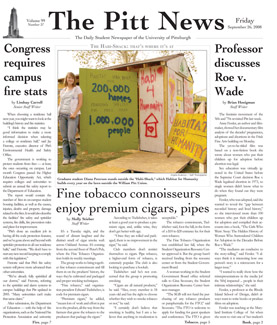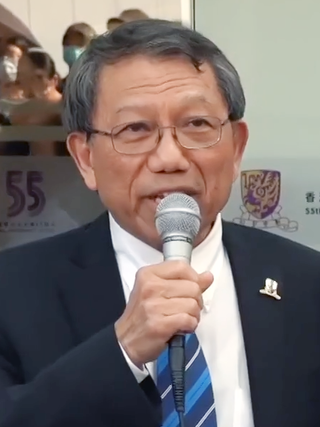Related Research Articles

The University of Pittsburgh is a public state-related research university in Pittsburgh, Pennsylvania. The university is composed of 17 undergraduate and graduate schools and colleges at its urban Pittsburgh campus, home to the university's central administration and around 28,000 undergraduate and graduate students. The 132-acre Pittsburgh campus includes various historic buildings that are part of the Schenley Farms Historic District, most notably its 42-story Gothic revival centerpiece, the Cathedral of Learning. Pitt is a member of the Association of American Universities and is classified among "R1: Doctoral Universities – Very high research activity". It is the second-largest non-government employer in the Pittsburgh metropolitan area.

United States Steel Corporation, more commonly known as U. S. Steel, is an American integrated steel producer headquartered in Pittsburgh, Pennsylvania, with production operations primarily in the United States of America and in Central Europe. The company produces and sells steel products, including flat-rolled and tubular products for customers in industries across automotive, construction, consumer, electrical, industrial equipment, distribution, and energy. Operations also include iron ore and coke production facilities.

The U.S. Steel Tower, also known as the Steel Building or USX Tower (1988–2001), is a 64-story skyscraper at 600 Grant Street in downtown Pittsburgh, Pennsylvania. The interior has 2,300,000 sq ft (210,000 m2) of leasable space. Standing 841 ft (256 m) tall, it is the tallest building in Pittsburgh, the fifth-tallest in Pennsylvania, and the 74th-tallest in the United States. It held its opening dedication on September 30, 1971.

Marathon Oil Corporation is an American company engaged in hydrocarbon exploration incorporated in Ohio and headquartered in the Marathon Oil Tower in Houston, Texas. A direct descendant of Standard Oil, it also runs international gas operations focused on Equatorial Guinea, offshore Central Africa.

The Joseph M. Katz Graduate School of Business is the graduate business school of the University of Pittsburgh located in Pittsburgh, Pennsylvania. Although business education had its origins at the university in 1907, the Graduate School of Business was established in 1960 from a merger of its predecessors, the School of Business Administration and the Graduate School of Retailing. It was renamed in 1987 after businessman and university alumnus benefactor Joseph Katz. The school offers a traditional, accelerated, part-time, business analytics, and executive Master of Business Administration (MBA) degrees as well as Master of Science degrees in Accounting, Business Analytics, Finance, Information Systems, Management, Marketing, Supply Chain Management and several Ph.D. programs in business. Katz is regularly ranked in the top 5% of Association to Advance Collegiate Schools of Business-accredited schools and in the top 0.3% of schools worldwide that grant business degrees.

Mark A. Nordenberg is the chancellor emeritus of the University of Pittsburgh and chair of the university's Institute of Politics. A professor of law and university administrator, Nordenberg served as the seventeenth Chancellor of the University of Pittsburgh from 1996 to 2014. Nordenberg served as the Dean of the University of Pittsburgh School of Law between 1985 and 1993 and other various administrative positions before becoming interim Chancellor of the University of Pittsburgh in 1995, a position which became permanent the following year. He became known as Nordy to many Pitt students, who voted to name a recreation center and arcade in the William Pitt Union as Nordy's Place, and is also the namesake of the university's endowed Nordenberg Scholarships and the Nordenberg Hall dormitory on the university's campus.

The Pitt News is an independent, student-written and student-managed newspaper for the main campus of the University of Pittsburgh in the Oakland neighborhood of Pittsburgh. The Pitt News has been active in some form since 1910 and is published online Monday through Friday, and in print on Wednesdays, during the regular academic year and Wednesdays during the summer.

The economy of Pittsburgh, Pennsylvania is diversified, focused on services, medicine, higher education, tourism, banking, corporate headquarters and high technology. Once the center of the American steel industry, and still known as "The Steel City", today the city of Pittsburgh has no steel mills within its limits, though Pittsburgh-based companies such as US Steel, Ampco Pittsburgh and Allegheny Technologies own several working mills in the Pittsburgh metropolitan area.
John P. Surma is an American businessman. He was the executive chairman of the board of United States Steel Corporation. Surma retired as CEO of U.S. Steel effective September 1, 2013, and Chairman effective January 1, 2014, positions he held since 2004.

Gardner Steel Conference Center (GSCC) is an academic building of the University of Pittsburgh and a contributing property to the Schenley Farms National Historic District and a Pittsburgh History and Landmarks Foundation Historic Landmark.

Michael L. Benedum Hall of Engineering is a landmark academic building on the campus of the University of Pittsburgh in Pittsburgh, Pennsylvania, United States. The building was designed in the brutalist style by the architectural firm of Deeter, Ritchey, and Sippel and completed in 1971 at a cost of $15 million. The building was honored with both the Pennsylvania Society American Institute of Architects Honor Award and Distinguished Building Award. It was built with a gift from the Claude Worthington Benedum Foundation and funds from the General State Authority. It stands on a 1.8-acre (7,300 m2) site that was formerly occupied by the National Guard's Logan Armory.
Clarence Peter Cazalot Jr. was president and chief executive of the Houston-based Marathon Oil Corporation. Since he took over control of the company in 2002, Marathon has expanded abroad with investments in the nascent gas industry of Equatorial Guinea and oil in Gabon, Libya and Norway. Its upstream earnings from overseas projects have been tripled and Marathon is beginning to sell off the smaller assets.
John A. Swanson is an American engineer, entrepreneur, and philanthropist. Swanson is the founder of ANSYS, Inc., a John Fritz Medal winner, and a member of the National Academy of Engineering. He is internationally regarded as an authority and pioneer in the application of finite-element methods to engineering.

Walter R. Arnheim is an American oil company executive and former director of the Washington National Opera. He is currently a renewable energy specialist, private equity manager, and an adviser to companies and non-profit organizations.
Dawne Eileen Sepanski Hickton is an American business executive. She is the chief operating officer and president of the aerospace, technology and nuclear businesses of the Jacobs Engineering Group. Before that, she was CEO of Pittsburgh-based RTI International Metals.
The Regional Industrial Development Corporation of Southwestern Pennsylvania--known colloquially as the RIDC--is a privately funded non-profit serving the Pittsburgh metropolitan area to focus on a regional approach to economic development primarily through managing and rehabilitating area research and business parks for modern tenants. The RIDC was formed on August 8, 1955 as a non-profit corporation after area business, corporate, government and labor leaders supported a central agency responsible for developing and coordinating efforts to create new employment and economic diversity. As of March 2013 it is listed as the third largest commercial property manager in metropolitan Pittsburgh with 7,400,000 gross leasable square feet, behind only Oxford Development and CBRE Group while surpassing Jones Lang LaSalle.
Gregory H. Boyce is an American businessman.

Rocky Tuan Sung-chi is a Hong Kong medical researcher and bioengineer, currently the vice-chancellor and president of the Chinese University of Hong Kong, where he served as distinguished visiting professor and director of the Institute for Tissue Engineering and Regenerative Medicine prior to taking up the vice-chancellorship. Previously he was on the faculty at the University of Pittsburgh, where he held a number of roles: Arthur J. Rooney Sr. Professor of Sports Medicine and the executive vice chair of the department of Orthopaedic Surgery, and a professor in the department of bioengineering. He was the director of the Center for Military Medicine Research and an associate director of the McGowan Institute for Regenerative Medicine. Despite his position in Hong Kong, he continues to serve as the director of the University of Pittsburgh's Center for Cellular and Molecular Engineering. For the 2018 fiscal year, he was one of the top 25 highest-paid University of Pittsburgh employees.
References
- 1 2 3 "Thomas J. Usher". NNDB. Retrieved 2009-12-18.
- ↑ "Board of Directors: Thomas J. Usher". Marathon Oil. Retrieved 2009-12-18.
- 1 2 Collins, Mark (March 1995). "Steel In Control". Pitt Magazine. Pittsburgh, PA: University of Pittsburgh. Retrieved 2009-12-18.
- ↑ Vinas, Tonya (2002-08-01). "Executive Word – Steel's Future: Smarter, Stronger". IndustryWeek. Retrieved 2009-12-18.
- ↑ "Thomas J. Usher Profile". Forbes.com. Archived from the original on February 10, 2009. Retrieved 2009-12-18.
- ↑ Hicks, Jonathan (1990-10-03). "Business People: USX Steel's New Head Sees Steady Demand". The New York Times. New York, NY. Retrieved 2009-12-18.
- ↑ Business Week (2007). Strategy Power Plays: How the World's Most Strategic Minds Reach the Top of Their Game. New York, NY: McGraw-Hill. pp. 111–120. ISBN 978-0-07-147560-0 . Retrieved 2009-12-18.
{{cite book}}:|last=has generic name (help) - 1 2 "Can You Teach People To Be Leaders? "Leadership Is Most Important During Difficult Times"" (PDF). Southpointe Perspective. Southpointe CEO Association (2007–1). Archived from the original (PDF) on July 4, 2008. Retrieved 2009-12-18.
- ↑ Hicks, Jonathan P. (1992-04-03). "The Steel Man With Kid Gloves". The New York Times. New York, NY. Retrieved 2009-12-18.
- ↑ Ciulla, Joanne B. (2004). Ethics, the heart of leadership. Westport, CT: Praeger Publishers. p. 53. ISBN 0-275-98248-3 . Retrieved 2009-12-18.
- ↑ Wayne, Leslie (2002-01-20). "Parched, Big Steel Goes to Its Washington Well". The New York Times. New York, NY. Retrieved 2009-12-18.
- ↑ Cox, James (2002-03-06). "Bush slaps tariffs on steel imports". USA Today. Retrieved 2009-12-18.
- ↑ "Testimony of Mr. Thomas J Usher". Washington, D.C.: U.S.-China Economics and Security Review Commission. 2001-08-02. Archived from the original on 2010-01-06. Retrieved 2009-12-18.
- ↑ Gannon, Joyce (2004-04-28). "Surma to take U.S. Steel reins". Pittsburgh Post-Gazette. Pittsburgh, PA. Retrieved 2009-12-18.
- ↑ "Pittsburghers of the Century: Thomas J. Usher". Pittsburgh Magazine. December 1999. Archived from the original on August 24, 2009. Retrieved 2009-12-18.
- 1 2 "20 Donors to Be Inducted Into Pitt's Cathedral of Learning Society June 29". Pitt Chronicle. Pittsburgh, PA: University of Pittsburgh. 2007-06-25. Retrieved 2009-12-18.
- ↑ Connelly, Brian (2004-02-23). "Five Pitt People Win Vectors Awards". Pitt Chronicle. Pittsburgh, PA: University of Pittsburgh. Retrieved 2009-12-18.
- ↑ "Saint Vincent College awards 253 degrees, honors Thomas Usher". Latrobe, PA: Saint Vincent College. Archived from the original on 2011-07-16. Retrieved 2009-12-18.